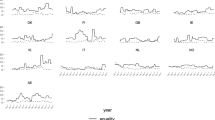Abstract
Young people today do not seem to be concerned about politics. They have almost no confidence in representative democracy’s main actors and institutions, and consequently many of them just do not vote. The problem is that they seem to feel less connected to the society they live in than previous generations did, so some sociologists call the 18–24-year-olds the ‘self-centred generation’. In the present article we will see that young people are more concerned than it seems, but they are reluctant to get more actively involved in public matters. The reason is that, generally, the education they receive does not give them the cultural background necessary to analyse and understand the world they live in, and either they have a very low opinion of politicians or they find them totally uninteresting, a political passivity that could be fatal for our democracies.
Similar content being viewed by others
References
Annan, K. (1998). Speech made at the opening of the first world conference of Ministers Responsible for Youth, Lisbon, 8 August. http://www.un.org/events/youth98/speeches/sgyouth2.htm. Accessed 11 October 2013.
Ball, J., & Clark, T. (2013). Generation self: What do young people really care about? The Guardian, 11 March 2013. http://www.theguardian.com/society/2013/mar/11/generation-self-what-young-care-about. Accessed 11 October 2013.
Demos & Pi. (2013). I giovani lontani dalla politica. http://www.demos.it/a00848.php?ref=HREC1-2. Accessed 10 August 2013.
Edwards, C. (1999). Introduction: Shadows and fragments. In C. Edwards (ed.), Roman presences: Receptions of Rome in European culture, 1789–1945 (pp. 1–18). Cambridge: Cambridge University Press.
Furlong, A., & Cartmel, F. (2007). Young people and social change: New perspectives. New York: Open University Press.
Levitsky, S., & Way, L. A. (2002). Elections without democracy: The rise of competitive authoritarianism. Journal of Democracy, 13(2), 51–65. doi:10.1353/jod.2002.0026.
Linz, J. J. (2000). Totalitarian and authoritarian regimes. Boulder, CO: Lynne Rienner.
Morrell, G., Scott, S., McNeish, D., & Webster, S. (2011). The August riots in England. Understanding the involvement of young people. London: National Centre for Social Research. http://www.natcen.ac.uk/media/769712/the%20august%20riots%20in%20england%20web.pdf. Accessed 22 August 2013.
Muxel, A. (2013). Rencontre avec Anne Muxel: ‘Les jeunes ont un nouveau rapport au politique’. Interviewed by C. Halpern. http://www.scienceshumaines.com/rencontre-avec-anne-muxel-les-jeunes-ont-un-nouveau-rapport-au-politique_fr_28305.html. Accessed 4 September 2013.
Occupy Wall Street. (2012). http://occupywallst.org. Accessed 6 September 2013.
Ortega y Gasset, J. (1986). La rebelión de las masas [The revolt of the masses] (25th edn.). Madrid: Espasa Calpe.
Putnam, R. D. (2000). Bowling alone: The collapse and revival of American community. New York: Simon & Schuster.
Roberts, D. S. (2009). Why we don’t vote: Low voter turnout in U.S. presidential elections. Honors thesis projects, University of Tennessee. http://trace.tennessee.edu/utk_chanhonoproj/1365. Accessed 11 October 2013.
Stranglers. (1977). No more heroes. London: United Artists Records.
Subileau, F., & Toinet, M. F. (1993). Les chemins de l’abstention. Une comparaison franco-américaine. Paris: Editions La découverte.
Urquizu, I. (2012). Los jóvenes y la política. El País, 16 July.
Walters, T. (2013). Do young people care about politics? Planet Ivy, 8 June. http://planetivy.com/uknews/45034/do-young-people-care-about-politics/. Accessed 3 September 2013.
Author information
Authors and Affiliations
Corresponding author
About this article
Cite this article
Aguilera-Barchet, B. Educating for democracy. European View 12, 171–178 (2013). https://doi.org/10.1007/s12290-013-0278-y
Published:
Issue Date:
DOI: https://doi.org/10.1007/s12290-013-0278-y




